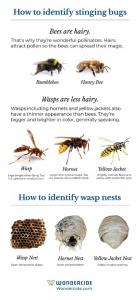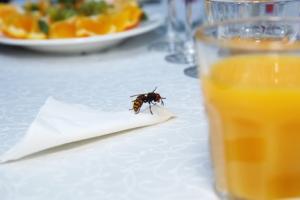Wondercide logo
AUSTIN, TX, UNITED STATES, September 12, 2023/EINPresswire.com/ — In late summer and fall, bees and wasps become noticeably more aggressive, often causing concern and unease among humans. While this shift in demeanor might seem alarming, there are scientific reasons rooted in the life cycle and ecological dynamics of these insects.
As the weather cools, colonies instinctively shift from reproduction and nest building to survival. This shift in priorities prompts changes in behavior that may manifest as increased aggression. Understanding these factors and taking appropriate precautions, pets and people can stay safe from the stings.
ECOLOGICAL FACTORS INFLUENCING AGGRESSION:
• Resource scarcity: As flowers and nectar sources dwindle, competition for remaining resources intensifies, prompting defensive behaviors to safeguard these vital supplies.
• Nest protection: With fewer individuals to guard the nest or hive, remaining bees and wasps may become more aggressive in protecting their homes from potential threats.
• Survival instincts: The impending winter triggers a survival instinct, prompting these insects to become more defensive and focused on self-preservation.
HOW TO TELL THE DIFFERENCE BETWEEN STINGING BUGS AND THEIR MOTIVATIONS:
• WASPS: Wasps can be social or solitary, however most wasp species are solitary. They capture another insect to feed their young. With the approach of winter, social wasps that have colonies produce new queens that will hibernate through the cold season. The decline in food availability for all wasps prompts them to become more aggressive in defending their nests and securing sustenance.
• HORNETS: These predatory insects are recognized for their larger size compared to other wasps. Hornets typically display black and yellow or black and white coloration on their bodies. They construct paper-like nests from chewed wood fibers and saliva, often suspended in sheltered locations. They’re known for their aggressive behavior because they vigorously defend their nests. They can deliver painful stings when threatened.
• YELLOW JACKETS: Known as social wasps, these stingers become even more voracious in the fall when food is scarcer. They seek out sweet things to consume including popular drinks enjoyed outside, fruits, and more. All females can sting with lance-like small barbs, and they do so without much provocation.
• HONEY BEES: The most well-known of the bee species, honey bees, exhibit a shift in behavior as they prepare for the winter. The hive’s population decreases, and worker bees become more protective of their dwindling resources. This can lead to heightened territorial behavior and a perceived increase in aggression.
• BUMBLEBEES: Bumblebees, while generally less aggressive than wasps, also undergo changes in behavior during late summer and fall. As the colony prepares for the winter, the focus shifts from raising new bees to preserving the current population. This transition can lead to bumblebees exhibiting increased vigilance and defensive behaviors.
COEXISTING HARMONIOUSLY:
• Maintain Distance: If encountering a bee or wasp, remain calm and avoid sudden movements. Slowly and calmly move away from the insect.
• Protect food and drinks: When outdoors, keep food and drinks covered to prevent attracting bees and wasps.
• Eliminate attractants: Seal trash cans tightly, clean up fallen fruit, and remove standing water to reduce attractants around the home.
WHEN WASPS, HORNETS AND YELLOW JACKETS INVADE:
Homeowners with venom allergies (or with suspected allergies) should never approach an aggressive insect. If venom allergies are present, bee stings, wasps, hornets and yellow jackets may also cause allergies.
Maintain a safe distance away from the insect by using a long-range spray, such as Wondercide Wasp & Hornet Spray. The lab-proven, plant-powered aerosol sprays up to 15 feet, and quickly kills wasps. It also kills hornets and yellow jackets.
• Do not spray into the air. Wait for the insect to land.
• Spray the insect for about 1 second to ensure it is completely coated.
• Wipe up the dead bugs and excess spray.
• Treat the Nests: Do not use any products on closed nests or for nests that are enclosed in small spaces like a wall.
• Don’t remove honeybee hives, as these important pollinators are declining. Find a local beekeeper or contact the American Beekeeping Federation who may be able to take them off of property.
• When treating open-faced nests with Wondercide’s Wasp & Hornet aerosol, use after dusk when insect activity outside the hive is minimal and do not stand beneath the nest.
• Safely remove all traces of the nest once wasps are dead.
Late summer and fall bring about a noticeable change in the behavior of bees and wasps across America, with increased aggression being a common characteristic during this period. This transformation is rooted in the insects’ life cycle and ecological dynamics, as they prepare for the challenges of the upcoming winter.
By understanding these factors and taking appropriate actions, individuals can coexist harmoniously with these vital pollinators while minimizing potential conflicts.
About Wondercide
As seen on Shark Tank, Wondercide is an Austin-based company that has protected almost 3 million families from bugs since 2009, and the ticker is still running! The company provides plant-powered, lab-proven solutions for those looking for alternatives to conventional pest control products and services. Wondercide’s pest protection line up is safe around the whole family when used as directed and meets the same effectiveness standards required for conventional products, harnessing the power of nature to do the job.
As a Green America Gold Certified business for high standards in social and environmental impact, the company is woman-founded and driven by Fierce Love® to help you Protect Your Pack®–pets, family, homes, indoors and outdoors, and everything in-between. Products are available at Wondercide.com, Amazon, Chewy and independent retailers in the USA. Come be part of our pack at Wondercide.com, Instagram, Facebook, TikTok, Twitter, Pinterest, YouTube and LinkedIn.
Affiliates available through Amazon and for Wondercide.com through ShareASale or Aspire.
Melissa Watkins
AMSTERLAND
+1 804-402-5316
email us here
Visit us on social media:
Facebook
Twitter
LinkedIn
Instagram
YouTube
TikTok
Other
![]()
Originally published at https://www.einpresswire.com/article/653922757/wondercide-provides-insight-into-seasonal-changes-of-wasps-and-bees-and-how-to-avoid-getting-stung-during-peak-season






